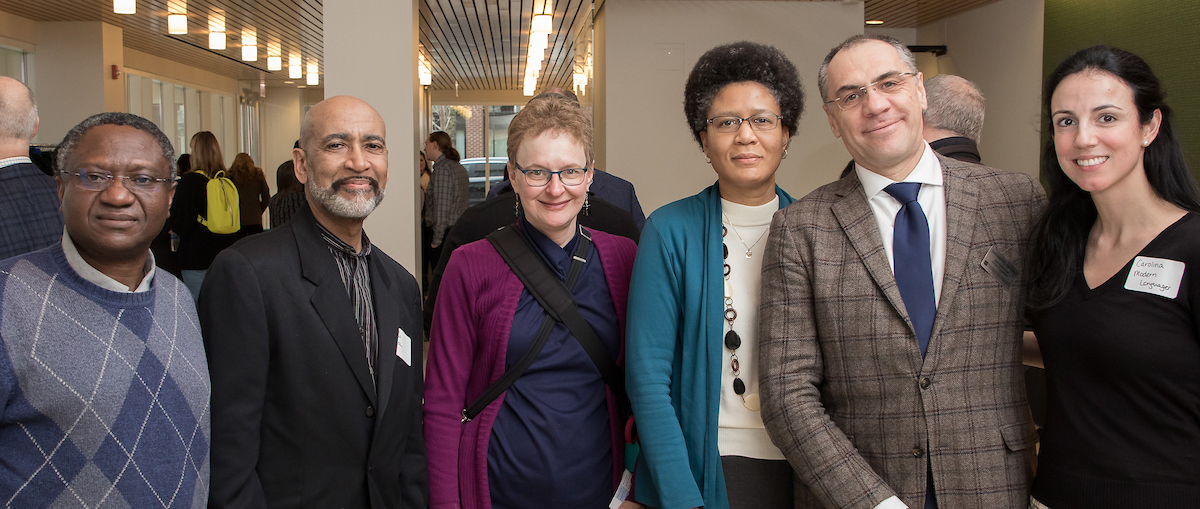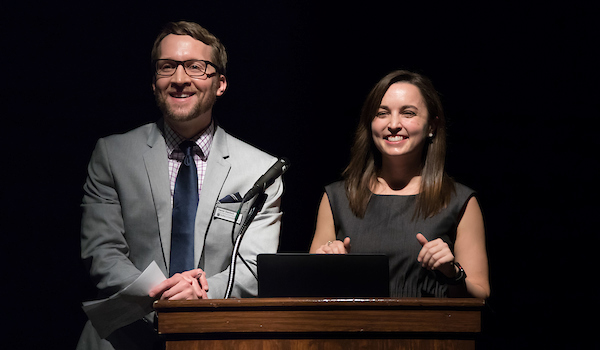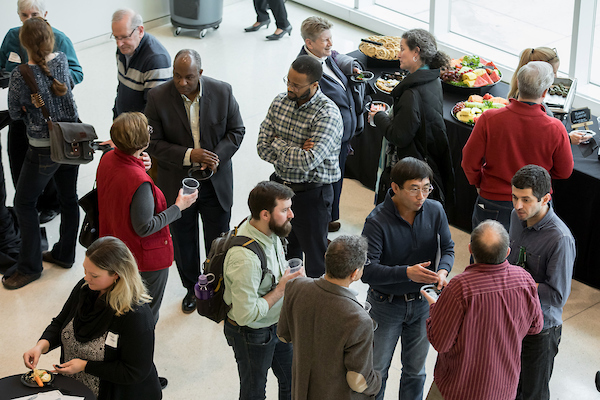 The university hosted DePaul Online Teaching Series 10th anniversary celebration event on Friday, Feb. 23. (DePaul University/Jeff Carrion)
The university hosted DePaul Online Teaching Series 10th anniversary celebration event on Friday, Feb. 23. (DePaul University/Jeff Carrion)
In 2008, Academic Affairs, in collaboration with Faculty Instructional Technology Services, launched the
DePaul Online Teaching Series, commonly referred to as DOTS. Now celebrating its 10th anniversary, the program has helped more than 600 faculty in 30 cohorts integrate online courses into their curricula.
"The main goal of developing this program was to make more courses accessible for more students," says Daniel Stanford, director of faculty development in FITS. "As more students began looking for online options, DePaul recognized an opportunity to help faculty develop courses specifically designed for online learning."
DOTS currently operates with two models held in three cohorts throughout the year. Over the course of three weeks - four weeks during the spring sessions - faculty spend a total of 40 hours in an immersive, hands-on experience. Participants learn about best practices, the latest technology innovations and quality standards across a variety of course delivery formats. The program also provides opportunities for faculty to interact with DOTS alumni who share a commitment to online learning and to develop a network of online-ready instructors.
 Daniel Stanford (left), director of faculty development, and Sarah Brown, a senior instructional technology consultant and current lead facilitator for DOTS, celebrated at the DOTS 10th anniversary event on Feb. 23. (DePaul University/Jeff Carrion)
Daniel Stanford (left), director of faculty development, and Sarah Brown, a senior instructional technology consultant and current lead facilitator for DOTS, celebrated at the DOTS 10th anniversary event on Feb. 23. (DePaul University/Jeff Carrion) "One of the best parts of this program is how interdisciplinary it is," says Sarah Brown, a senior instructional technology consultant in FITs and current lead facilitator for DOTS. "Faculty from all 10 colleges at DePaul have participated in this program over the years. We've even had outside auditors and people from the Chicago Theological Union enroll. It's a great way to get folks out of their silos and interacting and sharing with one another."
After completing the program, faculty have access to college, department and discipline-specific FITS consultants throughout the year. These consultants can help with anything from developing online curricula to setting up a page on D2L, DePaul's student interface site, and uploading content. Though the number of online classes at DePaul and faculty involvement in DOTS have grown over the last decade, the core makeup of classes has not.
"DOTS was not designed to put courses online for the sake of putting them online, or for maximizing the number of students enrolled per class," Stanford says. "Course sizes are still small; the standard DePaul caps still exist. What makes online courses at DePaul unique is that the Vincentian personalism of traditional DePaul courses is very much a part of these online and hybrid options. Students receive the same attention and resources they would in a classroom-based class."
Because technology and the field of education are constantly evolving, Stanford and the other staff in FITS hope to continue evaluating the program, learning from pioneers, and studying and incorporating emerging best practices into DOTS.
 On Feb. 23, the DOTS program celebrated its 10th anniversary at an event in The Theatre School. Since its launch, the program has helped more than 600 faculty in 30 cohorts integrate online courses into their curricula. (DePaul University/Jeff Carrion)
On Feb. 23, the DOTS program celebrated its 10th anniversary at an event in The Theatre School. Since its launch, the program has helped more than 600 faculty in 30 cohorts integrate online courses into their curricula. (DePaul University/Jeff Carrion)
"We're always looking for new research and ways to keep DOTS at the forefront of online teaching and learning," he says. "Many program alumni return to see what's new in the field. We hope to continue supporting our program vets and bring in new faculty who, even if they are apprehensive at first, are ready to venture into online teaching. We're here to help in any and every way."
If you're interested in enrolling in DOTS, visit the
program website for more information or contact
Sharon Guan, assistant vice president for FITS.